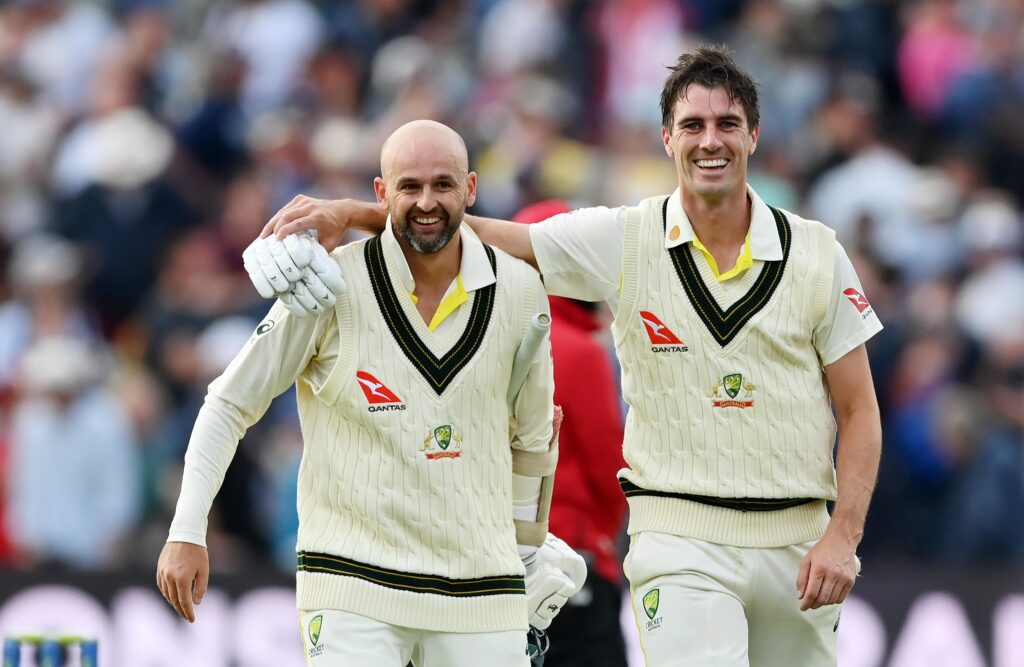
The iconic photo frame of Geraint Jones pouching a catch to dismiss Michael Kasprowicz at Edgbaston in 2005 is still etched in the minds of fans around the cricketing world. Around 18 years and 6500-odd days later, a little more history would be penned in connection with Edgbaston. And this time around, Australia emerged victorious by two wickets, with Pat Cummins, the Australian captain, hitting the winning runs. As he deflected one off Ollie Robinson through third man, the Australian dressing room was in raptures while the home crowd was silenced. Cummins himself went into delirium as he lifted Nathan Lyon in his arms.
It would certainly go down as Usman Khawaja’s and Cummins’ Test match. Cummins bagged a four-for in the second dig and also composed a brilliant unbeaten 44 in the second innings, alongside scoring a vital 38 in the first essay. Meanwhile, Khawaja crunched 141 in the first essay, and scored 65 off 197 in the second innings.
Such was the tension and drama in the final session that it would perhaps take thousands of words to cover all of it. England had started the session on the right note when Cameron Green was castled by Robinson for 28. Ben Stokes then showed his class and quality under pressure by removing Khawaja, the ultimate obstacle. He ran his fingers across the seam of the ball, and Khawaja edged it on to the stumps.
At that juncture, Joe Root bowled a fine spell, creating enough issues for Cummins and Alex Carey. Root also spilled a couple of half-chances, and one of them proved to be costly. In the 75th over, Carey drove one back to Root, but he couldn’t hold on to the sharp chance. Cummins then smashed one back at Root, but once again, he couldn’t snaffle the catch, although it came very low towards him.
Despite the second new ball being available, Stokes continued to use Root. The gamble paid off as Carey once again lofted it back towards Root, and this time around, he made no mistake, taking it on the second attempt. That was when Stokes made perhaps one of his rare mistakes as a captain. With the new ball available, he could have taken it and gone back to his seamers. After all, the matchup with two right-hand batters wasn’t in Root’s favour. Cummins took advantage of Root’s off-spin by twice lofting him for sixes that brought the equation down to 30 runs.
When the new ball was taken, Broad created one more chance, forcing Lyon to top-edge one to Stokes. The England skipper, who has taken some blinders in his career, almost pulled off another when he flew in the air to grab a one-handed catch. But it wasn’t to be. Stokes even tried to take it on the second attempt, but he spilled it. After that, Broad beat the bat of Lyon on numerous occasions with his away-going ball. He also got it to whistle past Cummins’ outside edge. It was a case of so near, yet so far for Broad. With just five needed, he forced Lyon to pull one off the splice. Ollie Pope, though, had instinctively ducked under. It was a very tough opportunity, but in such moments, only a miracle can win the game. And England needed one. Unfortunately for them, it didn’t happen.
Australia got close to England’s total thanks to another of Khawaja’s patient vigils. On occasions, he was beaten on the edge. There were other times, too, when he was squared up on the defence, but that didn’t seem to matter to Khawaja. He showcased reservoirs of concentration to navigate many tricky phases. His runs came in a diet of singles and twos, alongside the occasional boundary. David Warner (36), Cameron Green (28) and even Scott Boland (20), the nightwatchman, made some useful contributions. Australia would take as much satisfaction from winning a Test with no major contributions from either Marnus Labuschagne or Steve Smith.
So where did England go wrong? Should they have declared with the score reading 393 for 8 in the first innings? It was just the first day of a Test, and the wicket was still flat. England made several mistakes in the field – two catches dropped and one stumping missed in the first innings, alongside Broad taking a wicket via a no-ball. In the second essay, there were numerous half-chances. One of them was off Khawaja, and that too in the first over bowled by Anderson – the edge going right between Jonny Bairstow and first slip. Bairstow did make a crucial contribution with the bat in the first innings but his performance behind the stumps was poor.
Perhaps, with about 20 runs needed for Australia to win, Stokes could have given the second new ball to Anderson and told him – “This is your chance Jim to become an Ashes hero in perhaps your last Ashes series.” Granted he had a below-par game by his standards, but a last throw of the dice is worth it, especially when nothing is going your way.
Sometimes what could also happen is, X batter gets settled into a certain rhythm while facing a particular bowler. So, a slightly different release point or change in line and length could bring you a wicket. All England can do now is ponder after a gut-wrenching defeat. In the other dressing room, Australia would be celebrating all night. The bittersweet symphony of sport.



